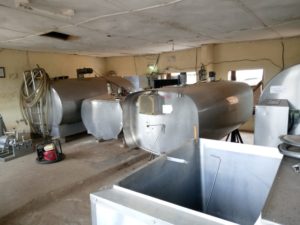Birunga Dairy, farmers feud over Shs 670m
A row has erupted between Birunga Dairy and more than 500 farmers in Ntungamo district over Shs 670m in unpaid dues.
The farmers who hail from Rushenyi County in Ntungamo district have also petitioned President Yoweri Museveni over alleged failure by Birunga Dairy to pay them Shs 670m for milk they supplied to the milk processer last year.
The farmers, who accuse Birunga Dairy’s proprietor, Innocent Bisangwa, of making empty promises with regard to their payment say their businesses are suffering as a result.

One of the petitioners, Joseph Nuunu, says that many locals who have been supplying the dairy with milk between last year and early this year are now stuck and on the verge of abandoning the business of dairy farming altogether.
John Bosco Ruhangasiimwe, another petitioner, says that the embattled farmers have no other source of income. He expressed hope that the farmers’ appeal to the president would bear fruit.
“We decided to bring this matter to the President’s attention so that he can come to our rescue.”
Moreen Mugyenyi, one of the aggrieved farmers, says that their only source of livelihood has been brought to a halt.
Mugyenyi, who says she used to supply Birunga Dairy with between 75-80 litres of milk daily, revealed that the company, which processes the popular Highland milk, owes her Shs 30m.
“Closure of the Uganda-Rwanda border turned to be serious for them [Birunga Dairy] since their products had a bigger market in Rwanda,” Mugyenyi says.
Ronald Turyagumanawe, another farmer, says that the already tough situation was worsened by the outbreak of the COVID-19 pandemic which left them out of business.
Proprietor responds
For his part, Bisangwa the proprietor of Birunga Dairy blames the downturn of his business on the bad relations between Uganda and her neighbours.
”I used to supply milk to Rwanda and Kenya, but due to the bad relations with our neighbours, I lost my main market and closed down operations,” he said.
Nevertheless, Bisangwa urged the farmers not to lose hope, revealing that he is pursuing a recapitalization plan that will see the dairy resume operations and clear all outstanding debts with its suppliers.
Still, he contends that the Shs 670m debt that the farmers are claiming is an exaggeration of the reality since his record books indicate a figure only half their claim.
Buy your copy of thecooperator magazine from one of our country- wide vending points or an e-copy on emag.thecooperator.news
The post Birunga Dairy, farmers feud over Shs 670m appeared first on The Cooperator News.
